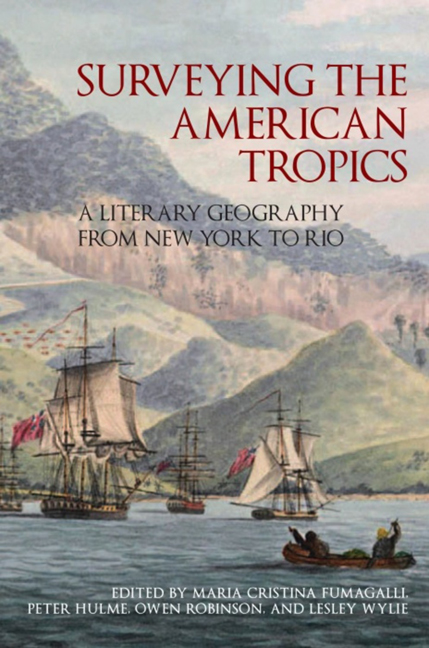Book contents
- Frontmatter
- Dedication
- Contents
- List of illustration
- Introduction
- A Tree Grows in Bajan Brooklyn: Writing Caribbean New York
- Reading the Novum World: The Literary Geography of Science Fiction in Junot Díaz's The Brief Wondrous Life of Oscar Wao
- Inventing Tropicality: Writing Fever, Writing Trauma in Leslie Marmon Silko's Almanac of the Dead and Gardens in the Dunes
- Imperial Archaeology: The American Isthmus as Contested Scientific Contact Zone
- Space Age Tropics
- Black Jacobins and New World Mediterraneans
- The Oloffson
- Dark Thresholds in Trinidad: Regarding the Colonial House
- Micronations of the Caribbean
- Golden Kings, Cocaine Lords, and the Madness of El Dorado: Guayana as Native and Colonial Imaginary
- Suriname Literary Geography: The Changing Same
- The Art of Observation: Race and Landscape in A Journey in Brazil
- Notes on Contributors and Editors
- Index
Inventing Tropicality: Writing Fever, Writing Trauma in Leslie Marmon Silko's Almanac of the Dead and Gardens in the Dunes
- Frontmatter
- Dedication
- Contents
- List of illustration
- Introduction
- A Tree Grows in Bajan Brooklyn: Writing Caribbean New York
- Reading the Novum World: The Literary Geography of Science Fiction in Junot Díaz's The Brief Wondrous Life of Oscar Wao
- Inventing Tropicality: Writing Fever, Writing Trauma in Leslie Marmon Silko's Almanac of the Dead and Gardens in the Dunes
- Imperial Archaeology: The American Isthmus as Contested Scientific Contact Zone
- Space Age Tropics
- Black Jacobins and New World Mediterraneans
- The Oloffson
- Dark Thresholds in Trinidad: Regarding the Colonial House
- Micronations of the Caribbean
- Golden Kings, Cocaine Lords, and the Madness of El Dorado: Guayana as Native and Colonial Imaginary
- Suriname Literary Geography: The Changing Same
- The Art of Observation: Race and Landscape in A Journey in Brazil
- Notes on Contributors and Editors
- Index
Summary
This essay reads the imagined space of the American Topics in Leslie Marmon Silko's novels, Almanac of the Dead and Gardens in the Dunes, against the European Enlightenment configuration of racialised bodies and disease. For European colonial invaders, the lands surrounding the present-day USA-Mexico border invoked images of the tropics. And yet calling this (in fact sub-tropical) part of the globe ‘the tropics’ was a way of defining a culturally alien and environmentally distinctive landscape against temperate Europe. As Europeans invented the tropicality of the Americas, they did not turn them into tropical Edens, as they presumed they would. The Americas became the ‘diseased’ lands, the tropical Inferno: since the colonial contact, pestilence, treaties, removal, forced relocation, and other expulsions of Native Americans from their homelands combine to result in what David E. Stannard would call ‘the worst human holocaust the world had ever witnessed.’ Environmental heat was transformed into the body heat of Native American sickness and became an appropriate metaphor for Silko to disclose the bitterness and poignancy of Native American traumatic history.
Indeed, within a few decades of European arrival in the New World, Native American populations were reduced by about ninety per cent by epidemics of smallpox, measles, and other fatal European diseases. These epidemics are now believed to have contributed at least as much as Spanish arms to toppling the Aztec and Inca Empires, destroying the indigenous populations with infections to which the conquerors were largely immune. Disease was also a potent factor in the European conceptualisation of Native American society: that the indigenous population contracted fatal diseases was considered evidence of their racial and physical inferiority. This was especially so by the close of the nineteenth century, when Europeans prided themselves on their scientific understanding of disease causation and mocked what they saw as ‘the fatalism, superstition and barbarity of indigenous responses to disease.’ Fostered by the growing understanding of disease aetiology and transmission in the late nineteenth century, Europeans took great pride in their innate racial and physical ‘superiority’.
- Type
- Chapter
- Information
- Surveying the American TropicsA Literary Geography from New York to Rio, pp. 75 - 100Publisher: Liverpool University PressPrint publication year: 2013



